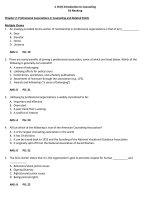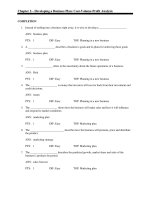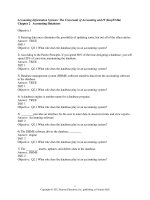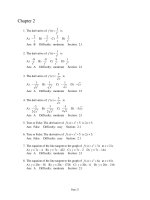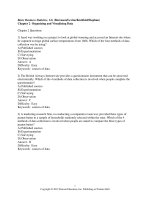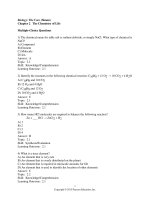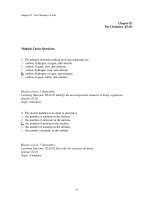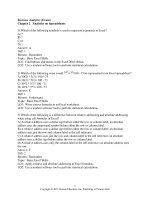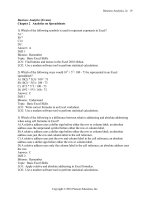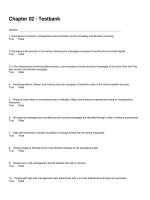Introduction to global business understanding the international environment and global business functions 1st edition gaspar test bank
Bạn đang xem bản rút gọn của tài liệu. Xem và tải ngay bản đầy đủ của tài liệu tại đây (318.52 KB, 20 trang )
Chapter 2: The Evolution of International Business
TRUE/FALSE
1. The growth trends in China and India today illustrate the impact that international business
has on blue-collar and white-collar workers in wealthy countries as relatively low-skill
factory jobs as well as high-skill service profession jobs migrate overseas.
ANS: T
PTS: 1
REF: p. 36
OBJ: LO: 02-01
STA: DISC: Environmental Influence
DIF: Difficulty: Moderate
NAT: BUSPROG: Diversity
KEY: Bloom's: Evaluation
2. One way international trade benefits consumers is by providing lower living standards.
ANS: F
PTS: 1
REF: p. 36
OBJ: LO: 02-01
STA: DISC: Environmental Influence
DIF: Difficulty: Moderate
NAT: BUSPROG: Diversity
KEY: Bloom's: Comprehension
3. It is estimated that for every billion dollars worth of exports from the United States, 100,000
domestic jobs are created.
ANS: F
PTS: 1
REF: p. 37
OBJ: LO: 02-01
STA: DISC: Environmental Influence
DIF: Difficulty: Challenging
NAT: BUSPROG: Diversity
KEY: Bloom's: Analysis
4. Foreign direct investment (FDI) in a country brings funds and business culture from abroad,
creates new well-paying jobs, introduces innovative technologies, and enhances the skills of
domestic workers.
ANS: T
PTS: 1
REF: p. 38
OBJ: LO: 02-01
STA: DISC: Environmental Influence
DIF: Difficulty: Moderate
NAT: BUSPROG: Diversity
KEY: Bloom's: Analysis
5. Emerging countries like Brazil, Russia, India, and China (BRIC) that have large
populations, an expanding middle class, and a combination of relatively low wage-rates and
rapidly growing economies tend to attract sizable less amounts of foreign investment.
ANS: F
PTS: 1
REF: p. 38
OBJ: LO: 02-01
STA: DISC: Environmental Influence
DIF: Difficulty: Moderate
NAT: BUSPROG: Diversity
KEY: Bloom's: Analysis
6. Dubai, a regional center for global companies, continues to attract sizable amounts of
foreign investment given its strategic location, world-class infrastructure, and productive
workforce.
ANS: T
PTS: 1
REF: p. 38
OBJ: LO: 02-01
STA: DISC: Environmental Influence
DIF: Difficulty: Challenging
NAT: BUSPROG: Diversity
KEY: Bloom's: Analysis
7. Mercantilists believed that for a nation to become wealthy, that nation must export as much
as possible and, in turn, import as little as possible.
ANS: T
PTS: 1
REF: p. 40
OBJ: LO: 02-02
STA: DISC: Environmental Influence
DIF: Difficulty: Moderate
NAT: BUSPROG: Diversity
KEY: Bloom's: Comprehension
8. Factor price equalization theory, states that when factors are allowed to move freely among
trading nations, efficiency increases, which leads to equality of factor prices among these
countries.
ANS: T
PTS: 1
REF: p. 43
OBJ: LO: 02-02
STA: DISC: Environmental Influence
DIF: Difficulty: Moderate
NAT: BUSPROG: Diversity
KEY: Bloom's: Comprehension
9. Porter exemplifies China as a powerhouse for consumer electronics because of the quality
and quantity of its engineers, and the ability and willingness of Chinese consumers to try out
new electronic products that are perfected and later exported.
ANS: F
PTS: 1
REF: p. 44
OBJ: LO: 02-02
STA: DISC: Environmental Influence
DIF: Difficulty: Challenging
NAT: BUSPROG: Diversity
KEY: Bloom's: Evaluation
10. Porter stresses the importance of domestic demand for goods and services when determining
a nation’s competitive advantage. When domestic demand remains high, the number of
suppliers will also be high.
ANS: T
PTS: 1
REF: p. 44
OBJ: LO: 02-02
STA: DISC: Environmental Influence
DIF: Difficulty: Moderate
NAT: BUSPROG: Diversity
KEY: Bloom's: Comprehension
11. Competitive industrial structures are unlikely to create innovative or dynamic firms willing
to compete abroad. However, a monopolistic industry will foster innovative, cost efficient,
aggressive firms that can adjust to changing economic conditions at home and will be well
prepared to compete abroad.
ANS: F
PTS: 1
REF: p. 45
OBJ: LO: 02-02
STA: DISC: Environmental Influence
DIF: Difficulty: Challenging
NAT: BUSPROG: Diversity
KEY: Bloom's: Analysis
12. An ad valorem tariff describes a tax on imports levied as a constant percentage of the
monetary value of one unit of the imported good.
ANS: T
PTS: 1
REF: p. 47
OBJ: LO: 02-03
STA: DISC: Environmental Influence
DIF: Difficulty: Easy
NAT: BUSPROG: Diversity
KEY: Bloom's: Knowledge
13. An export taxes refers to a negative tariff or tax aimed at boosting exports by lowering
export prices. On the other hand, export subsidy is meant to discourage exports and to keep
production at home.
ANS: F
PTS: 1
REF: p. 47
OBJ: LO: 02-03
STA: DISC: Environmental Influence
DIF: Difficulty: Moderate
NAT: BUSPROG: Diversity
KEY: Bloom's: Comprehension
14. Managed trade aims to replace global market or economic forces with government actions
to determine trade outcomes.
ANS: T
PTS: 1
REF: p. 49
OBJ: LO: 02-04
STA: DISC: Environmental Influence
DIF: Difficulty: Moderate
NAT: BUSPROG: Diversity
KEY: Bloom's: Comprehension
15. Developed countries often resort to managed trade for reasons of unethical labor practices
and violation of basic human rights.
ANS: T
PTS: 1
REF: p. 51
OBJ: LO: 02-04
STA: DISC: Environmental Influence
DIF: Difficulty: Moderate
NAT: BUSPROG: Diversity
KEY: Bloom's: Analysis
MULTIPLE CHOICE
1. The world’s two largest economies in terms of national income in the early-19th century
were _____.
a. China and India
b. the United States and Canada
c. Japan and China
d. India and Japan
e. the United States and Mexico
ANS: A
PTS: 1
REF: p. 35
OBJ: LO: 02-01
STA: DISC: Environmental Influence
DIF: Difficulty: Moderate
NAT: BUSPROG: Diversity
KEY: Bloom's: Knowledge
2. Analysts believe that by 2020 _____will become the world’s largest economy, followed by
_____ and _____.
a. India; the United States and China
b. China; the United States and India
c. Japan; China and Mexico
d. India; Japan and Canada
e. the United States; Mexico and Canada
ANS: B
PTS: 1
REF: p. 35
OBJ: LO: 02-01
STA: DISC: Environmental Influence
DIF: Difficulty: Challenging
NAT: BUSPROG: Diversity
KEY: Bloom's: Analysis
3. In the 3,000 B.C., Sumerian farmers realized that the grain surplus they produced could be
used as barter for things they did not have. Therefore, the Sumerians obtained copper from
Sinai Desert traders who were located several hundred miles to the west in order to make
weapons and repel nomadic raiders. The Sumerians engaged in _____
a. international business
b. in-border business
c. environmental business
d. national business
e. domestic business
ANS: A
PTS: 1
REF: p. 36
OBJ: LO: 02-01
STA: DISC: Environmental Influence
DIF: Difficulty: Challenging
NAT: BUSPROG: Diversity
KEY: Bloom's: Application
4. The two-way flow of exports and imports of goods and services is known as _____.
a. a partnership
b. a sole proprietorship
c. angel investing
d. a joint venture
e. trade
ANS: E
PTS: 1
REF: p. 36
OBJ: LO: 02-01
STA: DISC: Environmental Influence
DIF: Difficulty: Easy
NAT: BUSPROG: Diversity
KEY: Bloom's: Knowledge
5. Of the following statements about trade, which is NOT true?
a. Trade generates jobs in both export and import sectors of an economy.
b. The gains from open trade are always greater than the losses.
c. Open trade and investment does create winners and losers.
d. Trade does not influence culture.
e. Trade is the two-way flow of exports and imports of goods and services.
ANS: D
PTS: 1
REF: p. 37
OBJ: LO: 02-01
STA: DISC: Environmental Influence
DIF: Difficulty: Moderate
NAT: BUSPROG: Diversity
KEY: Bloom's: Analysis
6. It is estimated that for every billion dollars worth of exports from the United States _____
domestic jobs are created.
a. 5,000
b. 20,000
c. 100,000
d. 500,000
e. 1,000,000
ANS: B
PTS: 1
REF: p. 37
OBJ: LO: 02-01
STA: DISC: Environmental Influence
DIF: Difficulty: Challenging
NAT: BUSPROG: Diversity
KEY: Bloom's: Knowledge
7. Which of the following was NOT one of the top exporting nations in 2010?
a. The United States
b. South Korea
c. Italy
d. Australia
e. Belgium
ANS: D
PTS: 1
REF: p. 38
OBJ: LO: 02-01
STA: DISC: Environmental Influence
DIF: Difficulty: Challenging
NAT: BUSPROG: Diversity
KEY: Bloom's: Evaluation
8. The corporate practice of acquiring or producing quality goods or services at a lower cost
abroad thereby eliminating domestic production is called _____.
a. outsourcing
b. exporting
c. importing
d. foreign investment
e. trading
ANS: A
PTS: 1
REF: p. 38
OBJ: LO: 02-01
STA: DISC: Environmental Influence
DIF: Difficulty: Easy
NAT: BUSPROG: Diversity
KEY: Bloom's: Knowledge
9. Of the following statements about foreign direct investment, which is NOT true?
a. FDI in a country brings funds and business culture from abroad.
b. Governments all over the world try to create a business-friendly environment to
attract such investments.
c. FDI creates new well-paying jobs.
d. Foreign investors have little faith in high-income economies such as Canada.
e. Foreign investment flows are generally based on long-term global or country
outlook.
ANS: D
PTS: 1
REF: p. 38
OBJ: LO: 02-01
STA: DISC: Environmental Influence
DIF: Difficulty: Moderate
NAT: BUSPROG: Diversity
KEY: Bloom's: Analysis
10. Endowments used to produce goods and services are called _____.
a. factor equalizations
b. imports
c. outputs
d. factors of production
e. mercantilism
ANS: D
PTS: 1
REF: p. 40
OBJ: LO: 02-02
STA: DISC: Creation of Value
DIF: Difficulty: Easy
NAT: BUSPROG: Analytic
KEY: Bloom's: Knowledge
11. The oldest form of trade theory is called _____.
a. mercantilism
b. factor equalization
c. Machiavellianism
d. absolute advantage
e. comparative advantage
ANS: A
PTS: 1
REF: p. 40
OBJ: LO: 02-02
STA: DISC: Environmental Influence
DIF: Difficulty: Moderate
NAT: BUSPROG: Diversity
KEY: Bloom's: Knowledge
12. When was mercantilism practiced?
a. 1300-1400
b. 1500-1750
c. 1820-1875
d. 1900-1975
e. 1990-2010
ANS: B
PTS: 1
REF: p. 40
OBJ: LO: 02-02
STA: DISC: Environmental Influence
DIF: Difficulty: Moderate
NAT: BUSPROG: Diversity
KEY: Bloom's: Knowledge
13. Of the following statements about mercantilism, which is NOT true?
a. It was practiced as Europe emerged from the feudal systems of the Middle Ages
and moved toward nationalism
b. Mercantilists believed that for a nation to become wealthy, that nation must export
as much as possible and, in turn, import as little as possible.
c. During the time it was practiced, wealth was largely determined by the amount of
land one had access to.
d. Mercantilists did not want, or care, to see the big picture.
e. Mercantilists encouraged their people to produce large families.
ANS: C
PTS: 1
REF: p. 40
OBJ: LO: 02-02
STA: DISC: Environmental Influence
DIF: Difficulty: Moderate
NAT: BUSPROG: Diversity
KEY: Bloom's: Analysis
14. During the mid-18th century, British economist ________, who came to be known as the
father of free market and open trade systems, recognized the absurdity of Mercantilism.
a. Bertil Ohlin
b. Eli Heckscher
c. Adam Smith
d. Henry Ford
e. John Locke
ANS: C
PTS: 1
REF: p. 41
OBJ: LO: 02-02
STA: DISC: Environmental Influence
DIF: Difficulty: Moderate
NAT: BUSPROG: Diversity
KEY: Bloom's: Knowledge
15. Assume that because of soil and climatic conditions, Columbia is more efficient in the
production of coffee than India. At the same time India is more efficient in the production of
wheat than Columbia. Each of these countries can be said to have a(n) _____.
a. absolute advantage
b. comparative advantage
c. factor endowment destruction in land
d. bartering disadvantage
e. mercantile disadvantage
ANS: A
PTS:
1
DIF:
Difficulty: Challenging
REF: p. 41
OBJ: LO: 02-02
STA: DISC: Environmental Influence
NAT: BUSPROG: Diversity
KEY: Bloom's: Application
16. The ability of one country to produce a good or service more efficiently than another is
called a(n) _____.
a. absolute advantage
b. comparative advantage
c. barter trade
d. inorganic advantage
e. equalization efficiency
ANS: A
PTS: 1
REF: p. 42
OBJ: LO: 02-02
STA: DISC: Environmental Influence
DIF: Difficulty: Easy
NAT: BUSPROG: Diversity
KEY: Bloom's: Knowledge
17. The ability of one country that has an absolute advantage in the production of two or more
goods (or services) to produce one of them relatively more efficiently than the other is
called a(n) _____.
a. absolute advantage
b. comparative advantage
c. factor price
d. competitive advantage
e. equalization
ANS: B
PTS: 1
REF: p. 42
OBJ: LO: 02-02
STA: DISC: Environmental Influence
DIF: Difficulty: Moderate
NAT: BUSPROG: Diversity
KEY: Bloom's: Knowledge
18. The _____ theory attributes the comparative advantage of a nation to its factor endowments.
a. absolute advantage
b. comparative advantage
c. factor price
d. Heckscher-Ohlin
e. mercantilism
ANS: D
PTS: 1
REF: p. 42
OBJ: LO: 02-02
STA: DISC: Environmental Influence
DIF: Difficulty: Easy
NAT: BUSPROG: Diversity
KEY: Bloom's: Knowledge
19. The key assumptions for the H-O theory to work are: 1) perfect competition in the
marketplace; and (2) _____.
a. perfect immobility of factors of production among countries
b. superior allocation of production of goods and services
c. very small labor force
d. the existence of a trade surplus
e. the acceleration of a trade deficit
ANS: A
PTS: 1
REF: p. 43
OBJ: LO: 02-02
STA: DISC: Environmental Influence
DIF: Difficulty: Moderate
NAT: BUSPROG: Diversity
KEY: Bloom's: Comprehension
20. The _____ states that when factors are allowed to move freely among trading nations,
efficiency increases, which leads to price of factors becoming equal among countries.
a. factor-price equalization theory
b. diamond theory
c. trade policy theory
d. managed trade theory
e. trade deficit theory
ANS: A
PTS: 1
REF: p. 43
OBJ: LO: 02-02
STA: DISC: Environmental Influence
DIF: Difficulty: Moderate
NAT: BUSPROG: Diversity
KEY: Bloom's: Knowledge
21. When Poland entered the European Union –where there is free movement of labor across
member countries –some of the abundant Polish plumbers migrated to the United Kingdom
to fill the shortage there. The net result was that wages for plumbers in the U.K. stabilized or
softened and wage rates for plumbers in Poland increased. As the U.K. consumer of
plumbing services benefited from this development, one could argue that the real income of
the British consumer was, therefore, enhanced. This is an example of the _____.
a. factor-price equalization theory
b. diamond theory
c. trade policy theory
d. managed trade theory
e. trade deficit theory
ANS: A
PTS: 1
REF: p. 43
OBJ: LO: 02-02
STA: DISC: Environmental Influence
DIF: Difficulty: Challenging
NAT: BUSPROG: Diversity
KEY: Bloom's: Application
22. Who authored The Competitive Advantage of Nations?
a. Bertil Ohlin
b. Eli Heckscher
c. Michael Porter
d. Henry Ford
e. John Locke
ANS: C
PTS: 1
REF: p. 43
OBJ: LO: 02-02
STA: DISC: Environmental Influence
DIF: Difficulty: Easy
NAT: BUSPROG: Diversity
KEY: Bloom's: Knowledge
23. How does Porter’s model of national competitive advantage differ from the
Heckscher-Ohlin theory?
a. It looks more closely at the quality of factor endowments.
b. It examines only a country’s imports.
c. It examines only a country’s exports.
d. It does not encourage trade.
e. It does not explain why there are “winners” and “losers” in international trade.
ANS: A
PTS: 1
REF: p. 44
OBJ: LO: 02-02
STA: DISC: Environmental Influence
DIF: Difficulty: Challenging
NAT: BUSPROG: Diversity
KEY: Bloom's: Evaluation
24. Historically, the main instrument of trade policy has been _____.
a. export subsidy
b. export taxes
c. corporate duties
d. import tariff
e. special tariff
ANS: D
PTS: 1
REF: p. 47
OBJ: LO: 02-03
STA: DISC: Environmental Influence
DIF: Difficulty: Moderate
NAT: BUSPROG: Diversity
KEY: Bloom's: Knowledge
25. Until January 1, 2012, the price for ethanol consumers in the United States was higher than
world free-market price by $0.54 per gallon because of the $0.54 per gallon tariff imposed
by the U.S. government on ethanol imports. This is an example of a(n) _____ tariff.
a. custom
b. ad valorem
c. specific
d. preferential
e. generalized
ANS: C
PTS: 1
REF: p. 47
OBJ: LO: 02-03
STA: DISC: Environmental Influence
DIF: Difficulty: Challenging
NAT: BUSPROG: Diversity
KEY: Bloom's: Application
26. Taxes on imports that are collected by a designated government agency responsible for
regulating imports are called _____.
a. custom duties
b. ad valorem tariffs
c. specific tariffs
d. preferential tariffs
e. generalized tariffs
ANS: A
PTS: 1
REF: p. 47
OBJ: LO: 02-03
STA: DISC: Environmental Influence
DIF: Difficulty: Easy
NAT: BUSPROG: Diversity
KEY: Bloom's: Knowledge
27. An agreement where a large number of developed counties permit duty-free imports of a
selected list of products that originate from specific countries is known as _____.
a. a custom duty
b. an ad valorem agreement
c. an export agreement
d. the generalized system of preferences
e. an import agreement
ANS: D
PTS: 1
REF: p. 47
OBJ: LO: 02-03
STA: DISC: Environmental Influence
DIF: Difficulty: Easy
NAT: BUSPROG: Diversity
KEY: Bloom's: Knowledge
28. An agreement among WTO countries in which any tariff concession granted by one member
to any other country will automatically be extended to all other countries of WTO is called
the _____ principle.
a.
b.
c.
d.
e.
absolute advantage
comparative advantage
most favored nation
voluntary export
shared wealth
ANS: C
PTS: 1
REF: p. 48
OBJ: LO: 02-03
STA: DISC: Environmental Influence
DIF: Difficulty: Easy
NAT: BUSPROG: Diversity
KEY: Bloom's: Knowledge
29. The U.S. government may require that apparel imported into the United States should use
U.S. cotton, or use a certain amount of American labor. This is an example of a(n) _____.
a. quantitative restrictions
b. qualitative restrictions
c. domestic content import
d. voluntary export restriction
e. domestic content provision
ANS: E
PTS: 1
REF: p. 49
OBJ: LO: 02-03
STA: DISC: Environmental Influence
DIF: Difficulty: Challenging
NAT: BUSPROG: Diversity
KEY: Bloom's: Application
30. _____ refers to agreements, sometimes temporary, between countries (or a group of
countries) that aim at achieving certain trade outcomes.
a. Quantitative agreements
b. Qualitative agreements
c. Managed trade agreements
d. Voluntary export agreements
e. Domestic content provision agreements
ANS: C
PTS: 1
REF: p. 49
OBJ: LO: 02-04
STA: DISC: Environmental Influence
DIF: Difficulty: Moderate
NAT: BUSPROG: Diversity
KEY: Bloom's: Knowledge
31. Of the following, which is NOT in the socio-economic category of managed trade?
a. Ethics and safety
b. The infant industry argument
c. Countertrade
d. National security
e. Export cartels
ANS: D
PTS: 1
REF: p. 50
OBJ: LO: 02-04
STA: DISC: Environmental Influence
DIF: Difficulty: Moderate
NAT: BUSPROG: Diversity
KEY: Bloom's: Analysis
32. During the Soviet days, the government of India imported Soviet fighter jets and other
defense hardware in exchange for Indian-made consumer goods such as soaps, detergents,
and copy machines. This is an example of _____.
a. countertrade
b. illegal trade
c. an export cartel
d. an embargo
e. managed trade
ANS: A
PTS: 1
REF: p. 50
OBJ: LO: 02-04
STA: DISC: Environmental Influence
DIF: Difficulty: Challenging
NAT: BUSPROG: Diversity
KEY: Bloom's: Application
33. A group of countries that could effectively control export volume to keep their export
prices, revenues, and economic growth stable or high is known as a(n) _____.
a. alliance
b. joint venture
c. export cartel
d. embargo
e. managed trade agreement
ANS: C
PTS: 1
REF: p. 50
OBJ: LO: 02-04
STA: DISC: Environmental Influence
DIF: Difficulty: Easy
NAT: BUSPROG: Diversity
KEY: Bloom's: Knowledge
34. Of the following, which is NOT in the geo-political category of managed trade?
a. Ethics and safety
b. National security
c. Strategic industries
d. Embargoes
e. Protection of critical industries
ANS: A
PTS: 1
REF: p. 52
OBJ: LO: 02-04
STA: DISC: Environmental Influence
DIF: Difficulty: Moderate
NAT: BUSPROG: Diversity
KEY: Bloom's: Analysis
35. The United States has maintained a trade embargo for almost 50 years with _____ in an
attempt to put pressure on the country to move toward democracy.
a. the Ukraine
b. the Netherlands
c. Turkey
d. Italy
e. Cuba
ANS: E
PTS: 1
REF: p. 52
OBJ: LO: 02-04
STA: DISC: Environmental Influence
DIF: Difficulty: Moderate
NAT: BUSPROG: Diversity
KEY: Bloom's: Knowledge
COMPLETION
1. All commercial transactions, both private and public between nations of the world refers to
_________.
ANS: international business
PTS:
1
DIF:
Difficulty: Easy
REF: p. 36
OBJ: LO: 02-01
NAT: BUSPROG: Diversity
STA: DISC: Environmental Influence
KEY: Bloom's: Knowledge
2. The two-way flow of exports and imports of goods is called ______.
ANS: trade
PTS: 1
DIF: Difficulty: Easy
REF: p. 36
OBJ: LO: 02-01
NAT: BUSPROG: Diversity
STA: DISC: Environmental Influence
KEY: Bloom's: Knowledge
3. _______ refers to inflows of capital from abroad for investing in domestic plant and
equipment for the production of goods and/or services as well as for buying domestic
companies.
ANS: Foreign direct investment
PTS: 1
DIF: Difficulty: Moderate
REF: p. 37
OBJ: LO: 02-01
NAT: BUSPROG: Diversity
STA: DISC: Environmental Influence
KEY: Bloom's: Knowledge
4. _______ refers to the corporate practice of acquiring or producing quality goods or services
abroad at a lower cost thereby eliminating domestic production.
ANS: Outsourcing
PTS: 1
DIF: Difficulty: Moderate
REF: p. 38
OBJ: LO: 02-01
NAT: BUSPROG: Diversity
STA: DISC: Environmental Influence
KEY: Bloom's: Knowledge
5. _______ refers to a theory of international trade that supports the premise that a nation
could only gain from trade if it had a trade surplus.
ANS: Mercantilism
PTS: 1
DIF: Difficulty: Moderate
REF: p. 40
OBJ: LO: 02-02
NAT: BUSPROG: Diversity
STA: DISC: Environmental Influence
KEY: Bloom's: Knowledge
6. Endowments used to produce goods and services are called ______.
ANS: factors of production
PTS: 1
DIF: Difficulty: Easy
REF: p. 40
OBJ: LO: 02-02
NAT: BUSPROG: Diversity
STA: DISC: Environmental Influence
KEY: Bloom's: Knowledge
7. When the value of exports exceeds the value of imports, this refers to ______.
ANS: trade surplus
PTS: 1
DIF: Difficulty: Easy
REF: p. 40
OBJ: LO: 02-02
NAT: BUSPROG: Diversity
STA: DISC: Environmental Influence
KEY: Bloom's: Knowledge
8. _______ refers to the ability of one country to produce a good or service more efficiently
than another.
ANS: Absolute advantage
PTS: 1
DIF: Difficulty: Easy
REF: p. 42
OBJ: LO: 02-02
NAT: BUSPROG: Diversity
STA: DISC: Environmental Influence
KEY: Bloom's: Knowledge
9. The ability of one country that has an absolute advantage in the production of two or more
goods (or services) to produce one of them relatively more efficiently than the other refers to
______.
ANS: comparative advantage
PTS: 1
DIF: Difficulty: Moderate
REF: p. 42
OBJ: LO: 02-02
NAT: BUSPROG: Diversity
STA: DISC: Environmental Influence
KEY: Bloom's: Knowledge
10. All government actions that seek to alter the size of merchandise and/or service flows from
and to a country refers to ______.
ANS: trade policy
PTS: 1
DIF: Difficulty: Easy
REF: p. 47
OBJ: LO: 02-03
NAT: BUSPROG: Diversity
STA: DISC: Environmental Influence
KEY: Bloom's: Knowledge
11. ______ refers to taxes on imports (also known as custom duties in some countries).
ANS: Tariffs
PTS: 1
DIF: Difficulty: Easy
REF: p. 47
OBJ: LO: 02-03
NAT: BUSPROG: Diversity
STA: DISC: Environmental Influence
KEY: Bloom's: Knowledge
12. ______ refers to an import tax that assigns a fixed dollar amount per physical unit.
ANS: Specific tariff
PTS: 1
DIF: Difficulty: Easy
REF: p. 47
OBJ: LO: 02-03
NAT: BUSPROG: Diversity
STA: DISC: Environmental Influence
KEY: Bloom's: Knowledge
13. A tax on imports levied as a constant percentage of the monetary value of one unit of the
imported good refers to ______.
ANS: ad valorem tariff
PTS: 1
DIF: Difficulty: Moderate
REF: p. 47
OBJ: LO: 02-03
NAT: BUSPROG: Diversity
STA: DISC: Environmental Influence
KEY: Bloom's: Knowledge
14. ______ refers to an especially advantageous or low import tariff established by a nation for
all or some goods of certain countries and not applied to the same goods of other countries.
ANS: Preferential duties
PTS: 1
DIF: Difficulty: Moderate
REF: p. 47
OBJ: LO: 02-03
NAT: BUSPROG: Diversity
STA: DISC: Environmental Influence
KEY: Bloom's: Knowledge
15. ______ refers to an agreement where a large number of developed countries permit
duty-free imports of a selected list of products that originate from specific countries.
ANS: Generalized system of preferences
PTS: 1
DIF: Difficulty: Moderate
REF: p. 47
OBJ: LO: 02-03
NAT: BUSPROG: Diversity
STA: DISC: Environmental Influence
KEY: Bloom's: Knowledge
16. ______ refers to a negative tariff or tax aimed at boosting exports.
ANS: Export subsidy
PTS: 1
DIF: Difficulty: Easy
REF: p. 47
OBJ: LO: 02-03
NAT: BUSPROG: Diversity
STA: DISC: Environmental Influence
KEY: Bloom's: Knowledge
17. Taxes meant to raise export cost and divert production for home consumption refers to
_______.
ANS: export taxes
PTS: 1
DIF: Difficulty: Easy
REF: p. 47
OBJ: LO: 02-03
NAT: BUSPROG: Diversity
STA: DISC: Environmental Influence
KEY: Bloom's: Knowledge
18. ______ refers to an agreement among WTO countries in which any tariff concession
granted by one member to any other country will automatically be extended to all other
countries of WTO.
ANS: Most favored nation
PTS: 1
DIF: Difficulty: Moderate
REF: p. 48
OBJ: LO: 02-03
NAT: BUSPROG: Diversity
STA: DISC: Environmental Influence
KEY: Bloom's: Knowledge
19. _______ refers to regulations that limit the amount or number of units of products that can
be imported to a country.
ANS: Import quotas
PTS: 1
DIF: Difficulty: Easy
REF: p. 49
OBJ: LO: 02-03
NAT: BUSPROG: Diversity
STA: DISC: Environmental Influence
KEY: Bloom's: Knowledge
20. _______ refers to a non-tariff barrier in which an efficient exporting nation agrees to limit
exports of a product to another country for a temporary period.
ANS: Voluntary export restraint
PTS: 1
DIF: Difficulty: Moderate
REF: p. 49
OBJ: LO: 02-03
NAT: BUSPROG: Diversity
STA: DISC: Environmental Influence
KEY: Bloom's: Knowledge
21. Regulations requiring that a certain percentage of the value of import be sourced
domestically refers to _______.
ANS: domestic content provisions
PTS: 1
DIF: Difficulty: Moderate
REF: p. 49
OBJ: LO: 02-03
NAT: BUSPROG: Diversity
STA: DISC: Environmental Influence
KEY: Bloom's: Knowledge
22. Agreements, sometimes temporary, between countries (or a group of countries) that aim at
achieving certain trade outcomes refers to _______.
ANS: managed trade
PTS: 1
DIF: Difficulty: Moderate
REF: p. 49
OBJ: LO: 02-04
NAT: BUSPROG: Diversity
STA: DISC: Environmental Influence
KEY: Bloom's: Knowledge
23. Agreement in which an exporter of goods or services to another country commits to import
goods or services of corresponding value from that country is called ______.
ANS: countertrade
PTS: 1
OBJ: LO: 02-04
DIF: Difficulty: Moderate
NAT: BUSPROG: Diversity
REF: p. 50
STA: DISC: Environmental Influence
KEY: Bloom's: Knowledge
24. _______ refers to a group of countries that could effectively control export volume to keep
their export prices, revenues, and economic growth stable or high.
ANS: Export cartel
PTS: 1
DIF: Difficulty: Moderate
REF: p. 50
OBJ: LO: 02-04
NAT: BUSPROG: Diversity
STA: DISC: Environmental Influence
KEY: Bloom's: Knowledge
25. _______ refers to the temporary provision of protection to nascent industries that have good
prospects of becoming globally competitive in the medium term.
ANS: Infant industry argument
PTS: 1
DIF: Difficulty: Moderate
REF: p. 51
OBJ: LO: 02-04
NAT: BUSPROG: Diversity
STA: DISC: Environmental Influence
KEY: Bloom's: Knowledge
26. Trade sanctions which are imposed upon a nation to restrict trade with that country refers to
_______.
ANS: embargoes
PTS: 1
DIF: Difficulty: Easy
REF: p. 52
OBJ: LO: 02-04
NAT: BUSPROG: Diversity
STA: DISC: Environmental Influence
KEY: Bloom's: Knowledge
ESSAY
1. Defend the following statement: Trade and foreign investment are good for society.
ANS:
Student answers will vary.
PTS: 1
DIF: Difficulty: Moderate
REF: p. 35-40
OBJ: LO: 02-01
NAT: BUSPROG: Analytic
STA: DISC: Environmental Influence
KEY: Bloom's: Evaluation
2. Compare and contrast theories of absolute and comparative advatages.
ANS:
Student answers will vary.
PTS: 1
DIF: Difficulty: Challenging
REF: p. 41-42
OBJ: LO: 02-02
NAT: BUSPROG: Analytic
STA: DISC: Environmental Influence
KEY: Bloom's: Analysis
3. Differentiate between H-O theory and factor price equalization theory.
ANS:
Student answers will vary.
PTS: 1
DIF: Difficulty: Challenging
REF: p. 42-43
OBJ: LO: 02-02
NAT: BUSPROG: Analytic
STA: DISC: Environmental Influence
KEY: Bloom's: Analysis
4. Explain Porter’s “Diamond” model of national competitive advantage.
ANS:
Student answers will vary.
PTS: 1
DIF: Difficulty: Challenging
REF: p. 43-46
OBJ: LO: 02-02
NAT: BUSPROG: Diversity
STA: DISC: Environmental Influence
KEY: Bloom's: Comprehension
5. Briefly describe some of the main instruments of trade policy that countries use to interfere
with free trade.
ANS:
Student answers will vary.
PTS: 1
DIF: Difficulty: Moderate
REF: p. 47-48
OBJ: LO: 02-03
NAT: BUSPROG: Diversity
STA: DISC: Environmental Influence
KEY: Bloom's: Comprehension
6. Briefly explain the socio-economic and geo-political rationales that policymakers in
countries use in practicing managed trade.
ANS:
Student answers will vary.
PTS: 1
DIF: Difficulty: Challenging
REF: p. 49-53
OBJ: LO: 02-03
NAT: BUSPROG: Diversity
STA: DISC: Environmental Influence
KEY: Bloom's: Analysis
CASE
Scenario – Power Trip Unlimited, LLC
Is it hurricane season? Is there a tsunami warning? Did an earthquake take place
somewhere in the world? While these are not pleasant questions to ask, the Miami,
Florida-based business Power Trip Unlimited needs to be ready to quickly respond to such
events. This unique company offers a vast line of emergency generators and supplies to
help individuals caught in the devastation these types of natural occurrences can create.
Staffed by experts in the generator field, Power Tripp Unlimited has assisted numerous
people begin the recovery process in the aftermath of a calamity. In the past year alone,
sales for this company have surpassed every goal that was set. This financial boom
occurred while the company conducted sales only in the U.S. market.
Power Trip’s management team now realizes that foreign markets such as India and China
offer incredible opportunities for the company. Both foreign nations desire to engage in
trade with the company in exchange for allowing its products to be introduced within their
borders. India and China have agreed to supply Power Trip with several necessary
components for its generators in exchange for allowing the company free operations inside
their national boundaries. Power Trip realizes there are numerous challenges facing the
company in the foreign market arena. But guided by the belief in the expertise of its staff
and the quality of its products, it is ready to face any challenges foreign markets put in front
of them. This company stands eagerly poised awaiting its first international sale.
1. The agreement between Power Trip Unlimited, China, and India to engage in foreign trade
will ultimately provide greater opportunities for consumers of Power Trip’s products.
Which one of the following is least likely to be considered a benefit of this trade agreement?
a.
Consumer choices may be limited by government restrictions on the operational
capacity of the various products.
b.
There will be a greater amount of choice for consumers.
c.
Consumers may be offered a lower price on the goods.
d.
Consumers will be afforded a higher living standard.
e.
Consumers may have greater access to the product during emergency situations
ANS:
a
PTS: 1
DIF: Difficulty: Moderate
REF: p. 36-37
OBJ: LO: 02-01
NAT: BUSPROG: Reflective Thinking
STA: DISC: Environmental Influence
KEY: Bloom's: Evaluation
2. Which one of the following would be the least restrictive way in which India and China
could impede sales of Power Trip’s products within their borders despite the agreement to
allow free operations of the company within their nations’ boundaries?
a.
Place a tariff on the products
b.
Establish an ad valorem tariff for the products
c.
Establish a generalized system of preferences (GSP)
d.
Establish a very high specific tariff
e.
Establish stringent custom duties
ANS:
c
PTS: 1
DIF: Difficulty: Moderate
REF: p. 47-49
OBJ: LO: 02-03
NAT: BUSPROG: Reflective Thinking
STA: DISC: Environmental Influence
KEY: Bloom's: Analysis
3. The agreement reached between Power Trip and the two foreign nations where they would
sell components to Power Trip in exchange for allowing sales of its products within their
borders most closely resembles which one of the following?
a.
Subsidizing exports
b.
Establishing a generalized system of preferences
c.
Development of a domestic content provision
d.
Establishment of a quantitative restriction (QR)
e.
Engagement in countertrade
ANS:
e
PTS: 1
DIF: Difficulty: Moderate
REF: p. 49-50
OBJ: LO: 02-04
NAT: BUSPROG: Reflective Thinking
STA: DISC: Environmental Influence
KEY: Bloom's: Evaluation
Scenario – The Audrey Firm
The Audrey Firm is an international trade consulting firm currently providing its services in
eight foreign nations. The primary goal of this company is to prevent trade missteps from
taking place between foreign nations conducting business with each other. The
participating nations prefer to seek counsel with this firm before any of their actions result
in major international involvement or World Trade Organization intervention.
In the past, the Audrey Firm’s team of experts has handled international situations having
the potential to create serious unrest between neighboring countries. Their guidance and
expertise have been successful in keeping trade operating freely in several areas of the
globe. The Audrey Firm is receiving an award for their exemplary service later this year in
Washington D.C.
4. As one of the Audrey Firm’s more prestigious clients, OPEC, which exemplifies an export
cartel, requires constant overseeing to ensure it complies with the agreement arranged for
export cartels. Which one of the following items is least likely to appear on this type of
agreement?
a.
Substitutes for the goods being offered must not be available
b.
Demand for the product in question must be elastic
c.
There needs to be a strong demand for the product in question at basically any
price
d.
There must be no cheating on the stated agreement by the agreeing members
e.
Inelasticity in the demand for the product being offered must exist
ANS:
b
PTS:
1
DIF:
Difficulty: Moderate
REF: p. 50-51
OBJ: LO: 02-04
NAT: BUSPROG: Reflective Thinking
STA: DISC: Environmental Influence
KEY: Bloom's: Analysis
5. Many of the clients engaging the services of the Audrey Firm practice managed trade. All
of the following would most likely be a practice these nations engage in when conducting
trade with other nations except which one?
a.
Offer protection for specific companies
b.
Adhere to stringent guidelines concerning the use of child labor
c.
Pay close attention to the safety of products produced
d.
Embargoes are employed to punish nations engaging in offensive practices
e.
Strategic industries are given free rein in their trade practices
ANS:
e
PTS: 1
DIF: Difficulty: Moderate
REF: p. 49-53
OBJ: LO: 02-04
NAT: BUSPROG: Reflective Thinking
STA: DISC: Environmental Influence
KEY: Bloom's: Evaluation
6. The clients of the Audrey Firm use various techniques to restrict imports to their countries
other than tariffs. Which one of the following would not be considered a nontariff barrier
used by the clients of the Audrey Firm?
a.
Import quotas
b.
Voluntary export restraint
c.
Quantitative restrictions
d.
Preferential duties
e.
Domestic content provisions
ANS:
d
PTS: 1
DIF: Difficulty: Easy
REF: p. 49
OBJ: LO: 02-03
NAT: BUSPROG: Reflective Thinking
STA: DISC: Environmental Influence
KEY: Bloom's: Evaluation
